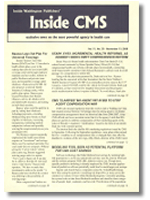Proponents of the new health overhaul law are frustrated with
the administration for not publicly weighing in on whether states may opt out
of Medicaid and shift that population into the insurance exchanges in 2014.
Residents below the poverty line would not be eligible for subsidies, health
reform boosters say, but others say an amendment in the reconciliation bill
made subsidies available to those below the poverty line.
The national coverage analysis that CMS opened on Provenge,
whether intended or not, fits into the parallel review initiative between CMS
and FDA, sources say, because companies may be more inclined to meet with CMS
earlier during FDA reviews to avoid having CMS question their product
immediately after approval. A Medicare advisory panel last week reviewed the
clinical evidence on the prostate-cancer drug, and they talked about ways to
gather more information, which included discussing whether CMS should collect
data from the registry that FDA is requiring as a condition of approval.
As part of its stepped-up enforcement posture, CMS has sanctioned
three health plans the agency says have violated Medicare rules that include
marketing malfeasance that in a few cases may have put patients health and
safety at risk, the agency announced Friday (Nov. 19) afternoon. The sanctions
could amount to fines on the plans, but could also result in CMS terminating
their contracts with Medicare.
CMS intends to allow the Medicare Advantage plans that
received the five-star rating for quality to market to Medicare beneficiaries
year-round and to enroll them at any time, a top CMS official tells Inside
Health Policy. Normally plans are only allowed to market their MA plans
from Oct. 1 through the open enrollment period (Nov. 15 - Dec. 31) and sign up
new patients during this time so the agency's move provides those plans with 5
stars a clear competitive advantage.
CMS Administrator Don Berwick finally faced Senate Finance
Committee on Wednesday during a hearing that featured a few tough questions
from the GOP side, but with few policy revelations. The hearing lasted only a
hour and a half due to scheduled votes, and nearly every GOP member expressed
frustration at the truncated schedule which limited questioning to five
minutes. Sen. Jim Bunning (R), the retiring junior senator from Kentucky,
warned Berwick that he will be appearing before lots of House committees next
Congress.
Senate Majority Leader Harry Reid (D-NV) gained Senate
passage late Thursday (Nov. 18) for a 31-day payment "patch" to the Medicare
sustainable growth rate formula that would freeze current rates and temporarily
avert a 23 percent cut to physicians slated for Dec. 1 after Finance Committee
leaders announced a two-part deal late in the day.
HHS provided a one-year accounting mechanism to give
so-called "mini-med" plans a break from the new medical loss ratio rule
announced Monday, rather than the straightforward exemption favored by many
stakeholders concerned that the rule could drive the limited benefit plans out
of business. But department officials said no one covered by a limited-benefit
policy will lose coverage next year as a result of the MLR, and a leading
supporter of special treatment for mini-meds expressed support for the approach
that HHS ultimately adopted.
The Premier health care alliance is touting a quality
demonstration program that resulted in $2 billion in savings over two years for
the 157 hospitals involved as a "test bed" for hospitals as they gear up for
future value-based purchasing initiatives under the health reform law.
Community pharmacies are concerned that some states may
reduce or do away with product and dispensing fees now that the federal
government has established a federal upper limit (FUL) on reimbursement which,
if states meet the ceiling, would allow pharmacies to break even on most of the
generic drugs they dispense, according to the National Community Pharmacists
Association (NCPA). Oregon and Alabama are the only states to propose adjusting
product and dispensing fees, but community pharmacists expect other states to
announce plans soon as state governments release budgets and state legislative
sessions begin.
CMS has decided to limit the health reform law's
"short-cycle" dispensing requirements to brand-name drugs and allow for longer
dispensing cycles for many pharmacies during the first year, responding to
long-term care and community pharmacies' concerns that broadly imposing the
requirements would unduly burden small pharmacies.
A draft technical assessment finding "moderate" evidence that
Provenge helps patients might lead CMS to limit coverage of the expensive,
newly approved prostate cancer vaccine to on-label use, analysts predict. The
assessment is somewhat of a relief, at least temporarily, to industry observers
who have worried that CMS would set a precedent by denying coverage for the
therapy over efficacy concerns.
Rep. Joe Barton (R-TX) was confident going into the House
Republican Conference meetings earlier this month that he was the "front
runner" to take over as chair of the powerful House Energy and Commerce
Committee, and said if he regains the gavel he will invite HHS and CMS
political appointees to "share their insights" about the law.
MLR Rule Closely Tracks NAIC Proposal
As CMS puts the finishing touches on its accountable care
organization proposed rule, a bipartisan group of 17 House lawmakers is asking
the agency to let specialists form ACOs, if those specialists also provide
primary care.
CMS is taking steps to expand hospital reporting of adverse
events in response to an HHS Inspector General finding that such events happen
to one in seven Medicare patients during hospital stays, costing Medicare $4.4
billion annually. The agency plans to broaden its definition of adverse events,
a move that will require hospitals to report more types of events that are factored
into what they are paid under the Hospital Value-Based Purchasing Program
created by health reform and the Healthcare-Acquired Conditions (HAC) payment
policy expanded by the reform law, the agency told the HHS IG's office.
|

